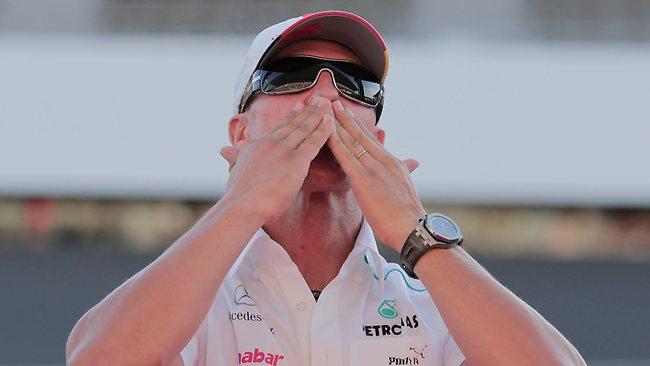Michael Schumacher leaves a nicer man this time around
MICHAEL Schumacher started the long walk into permanent retirement from Formula One last night - but it was off a very short plank.

MICHAEL Schumacher started the long walk into permanent retirement from Formula One last night - but it was off a very short plank.
The seven-times world champion made an emotional farewell speech under the awning of the makeshift Mercedes motorhome in the paddock of the Suzuka circuit, the scene of many a Schumacher epic.
The familiar sponsor cap decorated with stars to denote the tally of titles that make the German the most successful driver of all time was pulled down hard over the eyes and the mouth was tight and drawn.
The voice creaked occasionally as he pondered a career that had run the gamut from controversy to what appears to be a period of self-awareness in middle age - and the worst losing run in his long, long career.
Was there even just the tiniest hint of an apology for sins of the past? He looked puzzled when asked, but this is what he told a packed gathering that listened in absolute silence as he read from his script.
"In the past six years, I have learnt a lot about myself," he said. "For example, that you can open yourself without losing focus, that losing can be both more difficult and more instructive than winning. Sometimes I lost sight of this in the early years. But you appreciate to be able to do what you love to do, that you should live your convictions, and I was able to do so."
At the age of 43 and after 19 extraordinary seasons and one retirement, a newly humble Schumacher almost admitted his mistakes. He was certainly a much nicer man second time around.
Schumacher wanted to finish after three seasons attempting to resurrect former glories because his batteries were "in the red zone" and he did not have the energy any more to attack the young stars of F1.
How many times was it stressed that this was his decision - and his alone - to give up his second career with Mercedes? The reality was 50 metres away. The minute that Mercedes discovered they could capture Lewis Hamilton, the revolving door was turning to force Schumacher out.
In public, this was the united face of Mercedes, Schumacher flanked on one side by Norbert Haug, the giant carmaker's director of motorsport, and on the other by Ross Brawn, the technical genius who took him to seven titles at Ferrari and then persuaded his friend to come out of three years of retirement to stage a second career.
It did not work: the victories did not come and a single podium finish - third at this season's European Grand Prix - is the only silverware after more than 50 races with Mercedes. There are only six races left of this season, starting with the Japanese Grand Prix this weekend, in which to find final glory.
Whatever the truth of Schumacher's plea that he was in control of his destiny, there was never any realistic choice once Hamilton signed to become a Mercedes driver. As revealed by The Times last month, Schumacher had been kept in a holding pattern in case Hamilton changed his mind and stayed at McLaren. The only choice left was to retire or race for a lesser team, such as Sauber.
In a career that has plunged from extraordinary glory to the murky depths of motor-racing morality, even the farewell was ill timed. It came a week after Hamilton declared his intentions.
Surely, Schumacher could have been allowed the dignity of making his announcement first.
"During the past month I was not sure if I still had the motivation and energy, which is necessary to go on. It is not my style to do something that I am not 100 per cent for," Schumacher said. "(It is) hard to keep motivation and energy, it is natural you think about this more than when you are young. I have no hard feelings.
"It is without doubt we did not achieve our goals to develop a World Championship-fighting car, but it is also very clear that I can still be very happy about my overall achievements in the whole time of my career."
There was even a hint of humour, not usually a Schumacher strong point, at his second effort at leaving a sport he once dominated.
"Although I am still able to compete with the best drivers, at some point it is good to say goodbye - and this time, it could be for ever."
The poignancy was inescapable and the news spread quickly through the Suzuka paddock. Within minutes, it was time to sum up the Schumacher who was lured back from three years looking after his farm in Switzerland to do what he has done since the age of 6 - racing.
The danger is that Schumacher will be remembered for what has happened in the past three disappointing seasons rather than the scale of achievements he logged in the first part of his career. The men who rubbed shoulders with him could not begrudge his comeback.
As Jenson Button put it: "You are a long time retired."
For Mercedes, there is now a two-month goodbye and a future with a younger man, as well as a pointer from history: when Schumacher first retired in 2006, he was replaced at Ferrari by Kimi Raikkonen. The Finn won the World Championship a year later. Now Schumacher will wait to see if history repeats itself with Hamilton.
The Times


